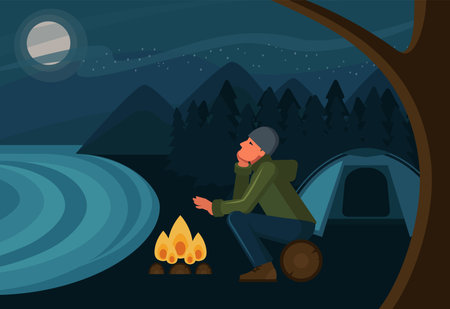Understanding Wild Camping in the UK
To truly appreciate the art of wild camping across the UK, one must first reflect on its rich tapestry of history and law—a landscape as varied as the rolling moors and craggy highlands themselves. The story begins in Scotland, a country where the right to roam is not just a phrase but a cherished principle enshrined in the Land Reform (Scotland) Act 2003. Here, wild camping is woven into the fabric of outdoor life, guided by the Scottish Outdoor Access Code, which encourages both freedom and responsibility. This deep-rooted tradition shapes a culture where pitching a tent under ancient pines or beside lochs is seen as an expression of respect for nature and heritage.
Contrast this with England, Wales, and Northern Ireland, where centuries-old notions of land ownership create a patchwork of rules. In most areas south of the Scottish border, wild camping remains technically prohibited without landowner permission, except for certain enclaves like Dartmoor—though even these rights have recently come under scrutiny. These restrictions are not merely legal quirks; they echo a history of enclosure and private estates, shaping attitudes towards access and stewardship. Despite these limitations, a quiet tradition persists: walkers and campers who tread lightly, seek solitude, and honour the landscapes they traverse.
This interplay between legal rights and unwritten customs has given rise to a uniquely British approach to wild camping—one that values discretion, minimal impact, and a sense of belonging to something greater than oneself. Whether in the open-hearted expanses of Scotland or the more regulated realms further south, each night spent beneath stars becomes a small act of trust between camper, community, and countryside. It is within this context that respectful wild camping takes root—not just as an adventure, but as a living conversation with Britain’s natural world and its people.
2. The Spirit of Respect: Leave No Trace Principles
The rolling moors, ancient woodlands, and windswept fells of the UK are more than backdrops to our wild camping adventures—they are living stories, shaped by generations before us and entrusted to our care. At the heart of responsible wild camping lies the spirit of respect, best embodied in the Leave No Trace ethos. This philosophy is woven seamlessly into British countryside codes and customs, encouraging us to tread lightly and cherish the delicate balance between human presence and wild beauty.
Leave No Trace is not merely a checklist; it is an attitude—one that honours the land, its wildlife, and fellow adventurers who seek solace beneath the same sky. In Britain, these principles resonate deeply with longstanding traditions such as the Countryside Code, which calls on all visitors to respect others, protect the natural environment, and enjoy outdoor spaces responsibly.
| Leave No Trace Principle | British Countryside Custom |
|---|---|
| Plan Ahead & Prepare | Check local bylaws and access rights before setting out |
| Travel & Camp on Durable Surfaces | Stick to established paths and avoid sensitive habitats like bluebell woods or peat bogs |
| Dispose of Waste Properly | Pack out all rubbish—including food scraps—and use public bins when available |
| Leave What You Find | Resist picking wildflowers or disturbing historical sites; leave stones and logs as you found them |
| Minimise Campfire Impact | Avoid open fires; use a stove or fire bowl if allowed, and never scar the land with burnt patches |
| Respect Wildlife | Observe from a distance; keep dogs under close control during nesting season; never feed animals |
| Be Considerate of Others | Keep noise to a minimum; pitch tents away from homes, farms, or busy footpaths; greet fellow walkers with a friendly nod or “Good morning” |
This deep-rooted sense of stewardship is what distinguishes British outdoor culture. We are not simply passing through; we are participants in a living landscape where every footprint matters. By embodying Leave No Trace in both action and spirit, we ensure that wild places remain welcoming—unspoilt for those who follow in our footsteps.

3. Building Connections: Fostering a Sense of Community
There’s something quietly magical about the way the British landscape draws us together—a mosaic of rolling hills, ancient woodlands, and craggy coastlines that have long inspired wanderers to seek solace and adventure beneath vast, shifting skies. Within this rich tapestry, outdoor communities across the UK are woven together not just by their love for wild places, but also by the values they uphold as stewards of these cherished spaces. When we embrace respectful wild camping practices, we do more than simply pitch our tents with care—we become threads in a living network, each of us playing a part in shaping the culture of belonging that makes exploring Britain’s wild corners so rewarding.
Wild camping, when practiced thoughtfully and with respect for nature and local traditions, fosters a sense of kinship among those who tread softly on the land. Whether it’s sharing tips over a steaming mug of tea beside a drystone wall in Yorkshire, or swapping stories under a star-pricked sky in the Highlands, these moments of connection help knit together a supportive community. It is here that seasoned explorers pass on knowledge to newcomers—about leaving no trace, respecting private land, and embracing the unspoken etiquette that keeps our wild places welcoming for all.
By championing these values, we cultivate an atmosphere where mutual respect flourishes. Every gentle footstep and considerate gesture becomes a quiet act of stewardship—a promise to each other and to the land itself. As word spreads within walking groups, climbing clubs, and online forums dedicated to Britain’s great outdoors, the message grows stronger: wild camping is not just an adventure, but a shared responsibility. Together, we are custodians of tradition and protectors of the landscapes that inspire us—ensuring that future generations can experience their own sense of wonder under open British skies.
4. Communicating the Message: Educating with Empathy
Sharing the message of respectful wild camping in the UK is not merely about rules and regulations—it’s about nurturing a deeper connection to our cherished landscapes. To truly inspire change within outdoor communities, thoughtful communication rooted in empathy is essential. By embracing storytelling, local workshops, and peer support, we create a culture where everyone feels included, understood, and invited to discover the magic of Britain’s wild spaces.
The Power of Storytelling
Stories have long been at the heart of British tradition—from fireside tales on Dartmoor to whispered legends across the Scottish Highlands. By sharing personal anecdotes about responsible wild camping, we invite others to join a narrative where respect for nature becomes second nature. These stories can be shared around campfires, within local hiking groups, or through digital platforms, weaving together voices from all walks of life and backgrounds.
Local Workshops: Bringing Knowledge to Life
Workshops offer a hands-on approach to education that goes beyond leaflets or online guides. Hosting sessions in village halls, community centres, or even out on the fells encourages participation and practical learning. Topics might include:
| Workshop Topic | Description |
|---|---|
| Leave No Trace Principles | Interactive demonstrations on minimising impact |
| Navigation Skills | Map reading and orienteering tailored to local terrains |
| Cultural Heritage | Learning about local customs and countryside codes |
Peer Support: Fostering Inclusivity and Understanding
Support from fellow outdoor enthusiasts can make all the difference for those new to wild camping. Peer mentoring schemes encourage knowledge-sharing in a relaxed, friendly environment—whether it’s a seasoned camper offering tips over a cuppa or an experienced rambler leading a group walk. This sense of camaraderie helps break down barriers and ensures that everyone, regardless of background or ability, feels welcome in the outdoors.
Nurturing Joyful Discovery
The essence of British wild camping lies in discovery—the call of curlews at dawn, the hush of ancient woodlands after rain. By communicating with empathy and fostering inclusive learning opportunities, we ensure these moments remain accessible for generations to come. Through storytelling, workshops, and peer connections, we don’t just share knowledge; we celebrate the beauty and freedom found in Britain’s untamed places.
5. Championing Local Perspectives and Traditions
Wild camping in the UK is more than just a personal adventure—it is an invitation to step gently into landscapes shaped by centuries of local tradition, folklore, and stewardship. Whether you’re waking to the salt-laced breeze atop Cornish cliffs, wandering through the heathered hush of Scottish glens, or finding solace amid the rolling fells of the Lake District, each region sings with its own story. To camp respectfully is to listen to these stories, to recognise that every footpath, dry stone wall, and windswept hill carries generations of meaning for those who call these places home.
Championing local perspectives means seeking out the voices of residents, landowners, and heritage groups. It is about understanding that what feels wild and untouched to us may be woven with livelihoods, ancient rights of way, or sacred ground for others. In Cornwall, for example, coastal paths are as much about history as they are about horizon—ask locals about their connections to smugglers’ coves or hidden springs, and your journey becomes richer. In Scotland, respect for the ‘right to roam’ goes hand in hand with honouring community wishes and leaving bothies as you found them. And in the Lake District, where sheep farming shapes the hillsides as surely as rain and wind, supporting conservation efforts preserves beauty for all.
Listening Before Laying Down Roots
Before pitching your tent or lighting a stove, pause to learn: is this spot cherished for bluebell displays in spring? Does it border farmland where lambs graze? Are there local festivals or traditions that shape how people use these spaces? By asking—and truly listening—we demonstrate humility and gratitude for the privilege of wild camping.
Collaborating With Communities
Consider connecting with local rangers or visitor centres before heading out; many offer invaluable insights on best practices and current concerns. Support small businesses and artisans along your route—your presence can be a positive force when guided by respect.
Cherishing Heritage Through Storytelling
Finally, share what you learn. Pass on tales of ancient stone circles glimpsed at dawn or the advice of a farmer met on a misty lane. By celebrating regional ways and championing local wisdom, we weave ourselves thoughtfully into the living tapestry of Britain’s wild places—honouring both the land and those who tend it.
6. Inspiring the Next Generation
For the message of respectful wild camping to truly take root, it must be carried forward by those who will shape the future: our young people. Across the UK, schools, Scouts, and youth groups play a vital role in instilling outdoor ethics and fostering an enduring appreciation for the British countryside. Their influence is woven into the very fabric of local communities, nurturing both practical skills and a sense of wonder that transcends generations.
The Classroom as a Gateway
In classrooms from Cornwall to the Highlands, lessons about ecology and Leave No Trace principles are more than just curriculum—they are invitations to engage with nature thoughtfully. Teachers serve as guides, opening doors to field trips and hands-on learning that reveal the delicate balance between human presence and wild spaces. By weaving respect for the outdoors into education, schools plant seeds that blossom into lifelong stewardship.
Scouting Traditions & Youth Group Adventures
The time-honoured traditions of the Scouts and other youth organisations offer young people their first taste of wild camping under star-dappled skies. These experiences are more than mere outings; they are rites of passage where camaraderie is forged around campfires and responsibility is learned through practice. Leaders teach not only how to pitch tents or map read but also how to tread lightly, honouring both land and community with every step.
Kindling Curiosity & Awe
Fostering a sense of wonder is perhaps the most powerful tool in passing on outdoor ethics. When children gaze up at ancient oaks or trace streams through bracken, they develop an emotional connection that inspires care and respect. Programmes that encourage exploration—be it pond-dipping in Surrey or hiking in Snowdonia—awaken curiosity and cultivate guardianship for the wild places they come to cherish.
By empowering the next generation with knowledge, experience, and reverence for nature, we ensure that the story of respectful wild camping continues to unfold across Britain’s breathtaking landscapes—one inspired young camper at a time.


